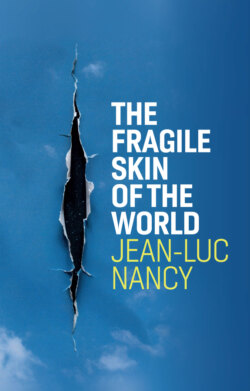Читать книгу The Fragile Skin of the World - Jean-Luc Nancy - Страница 12
5
ОглавлениеWhat exhausts itself is the West itself. This affirmation, to restate it once more, has nothing to do with a teleological or destiny-oriented vision: the succession of Western sequences obeys an investment the limit of which can consist only in a loss of the very possibilities of investing. This may be what is happening to us right now. But it would therefore not be a matter solely of energetic limits – whether one speaks of kinetic energy, of the appetite for domination, or of the exponential growth of wealth. If one or another of these registers, or more likely the weaving-together of all three, undergoes a serious collapse, it will only be to the extent that the investment underpinning the entire ensemble has begun to collapse: namely, that of a power that is unlimited – whose investment, in other words, consists of its own exercise.
At the horizon of an endless expansion of technics and its domination, it is no longer a matter of being ‘master and possessor of nature’ as Descartes wished it: it is a matter of taking an endless pleasure in oneself (somewhat in the manner of the Hegelian spirit), which also (endlessly) ends up in a complete self-exhaustion. It is no longer a matter of man, but of a self-sufficiency equal to his self-exhaustion.
It is extremely tempting at this point to protest that it makes no sense to think that man, and perhaps life and nature alongside him, might disappear in this passage to the limit of his own power. Why would it not make sense? The question can be asked. It is not clear that the value that we believe we attribute to man – and even the one we believe we attribute to life – is a value, in other words a sense worthy of this name. In fact, it may be that, if the sense of man and that of life were given by man himself, or indeed by life itself, they would remain far removed from what an infinite sense would demand! Hans Jonas assured us that our responsibility is ‘to ensure the permanence of an authentically human life on earth’.5 The term ‘authentically’ harbours a problem that paralyses from the outset the very idea of such a responsibility.
The idea of an authentic man or an authentic life can only be spoken of from a point of view that is neither human nor living, which is precisely what we lack.
It is impossible for us to decide in favour of an authenticity whose content is not indicated to us – or, on the contrary, if everything about this authenticity might lead us to consider that its content is to be found precisely in the endless deployment of an autonomous power, one that would have spread via man to the entire world. What if authentic man were the one by way of whom the final blaze of glory, and subsequent extinction of the ‘creative unconscious’, came to fruition?
One could do much worse than to consider the Heideggerian motif of the Brauch of man by being: the use of man by his own ex-istence – and thus the use of use itself, of its utilization, of its utility and its erosion [usure] as the erosion of sense itself. Because sense, after all, does not have to be interminable. It is rather infinite each time in the truth of its interruption: in an encounter, in a culture, in a work, in an existence. In this sense, it is interminable because it can always be interrupted and revive itself in or from its interruption (all of the issues concerning the ‘work’ come together in this point).
